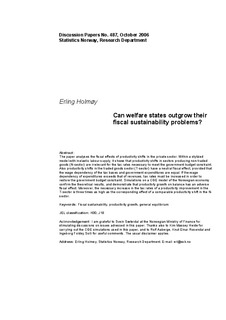| dc.contributor.author | Holmøy, Erling | |
| dc.date.accessioned | 2011-11-13T16:57:14Z | |
| dc.date.available | 2011-11-13T16:57:14Z | |
| dc.date.issued | 2006 | |
| dc.identifier.issn | 1892-753x | |
| dc.identifier.uri | http://hdl.handle.net/11250/180673 | |
| dc.description.abstract | Abstract:
The paper analyses the fiscal effects of productivity shifts in the private sector. Within a stylized
model with inelastic labour supply, it shows that productivity shifts in sectors producing non-traded
goods (N-sector) are irrelevant for the tax rates necessary to meet the government budget constraint.
Also productivity shifts in the traded goods sector (T-sector) have a neutral fiscal effect, provided that
the wage dependency of the tax bases and government expenditures are equal. If the wage
dependency of expenditures exceeds that of revenues, tax rates must be increased in order to
restore the government budget constraint. Simulations on a CGE model of the Norwegian economy
confirm the theoretical results, and demonstrate that productivty growth on balance has an adverse
fiscal effect. Moreover, the necessary increase in the tax rates of a productivity improvement in the
T-sector is three times as high as the corresponding effect of a comparable productivity shift in the Nsector. | no_NO |
| dc.language.iso | eng | no_NO |
| dc.publisher | Statistics Norway, Research Department | no_NO |
| dc.relation.ispartofseries | Discussion Papers;No 487 | |
| dc.subject | Welfare | no_NO |
| dc.subject | Fiscal sustainability | no_NO |
| dc.subject | Productivity growth | no_NO |
| dc.subject | Computable general equilibrium model (CGE model) | no_NO |
| dc.subject | JEL classification: H30 | no_NO |
| dc.subject | JEL classification: J18 | no_NO |
| dc.title | Can welfare states outgrow their fiscal sustainability problems? | no_NO |
| dc.type | Working paper | no_NO |
| dc.subject.nsi | VDP::Social science: 200::Economics: 210::Economics: 212 | no_NO |
| dc.source.pagenumber | 25 s. | no_NO |
